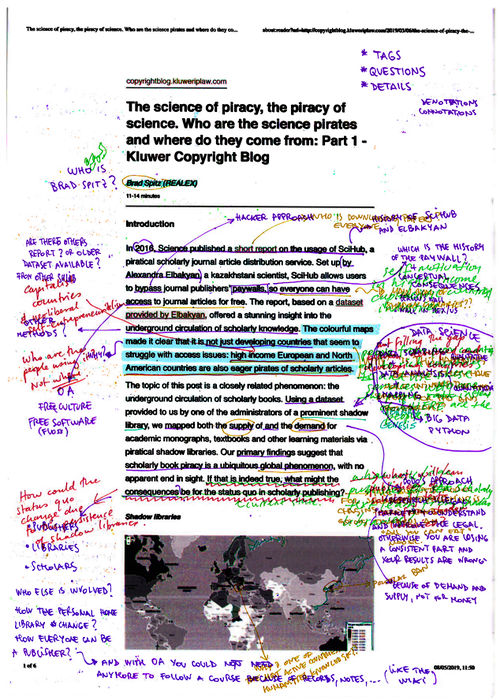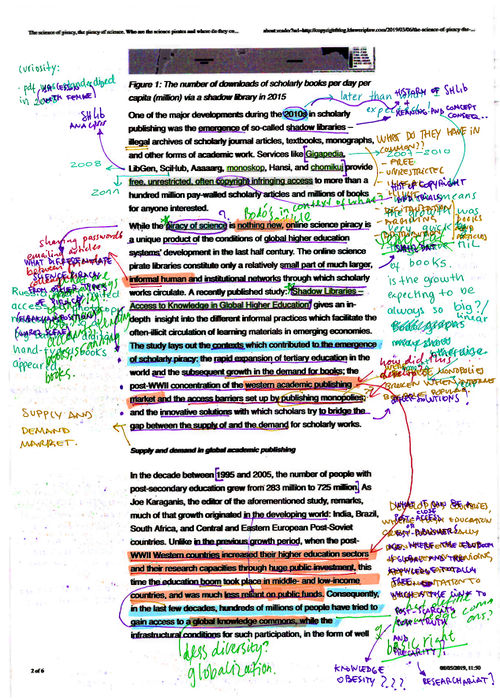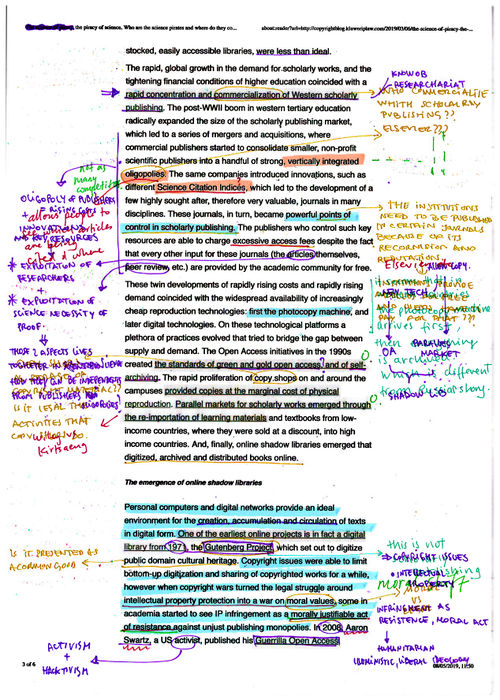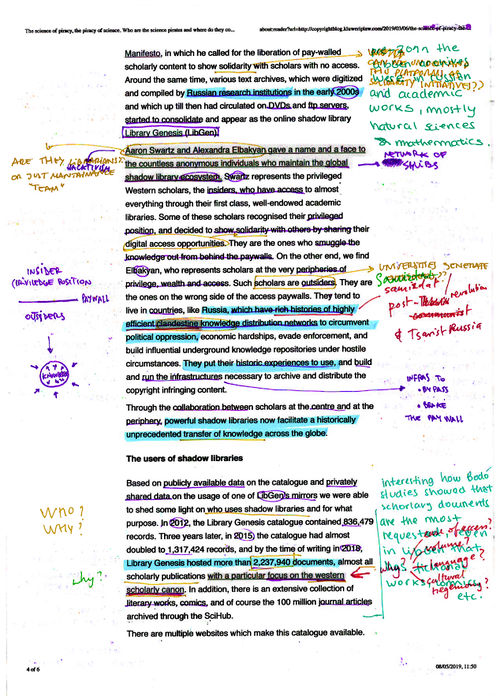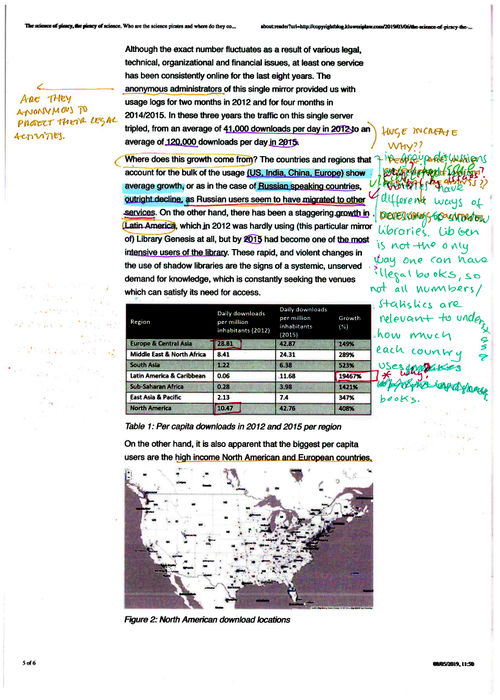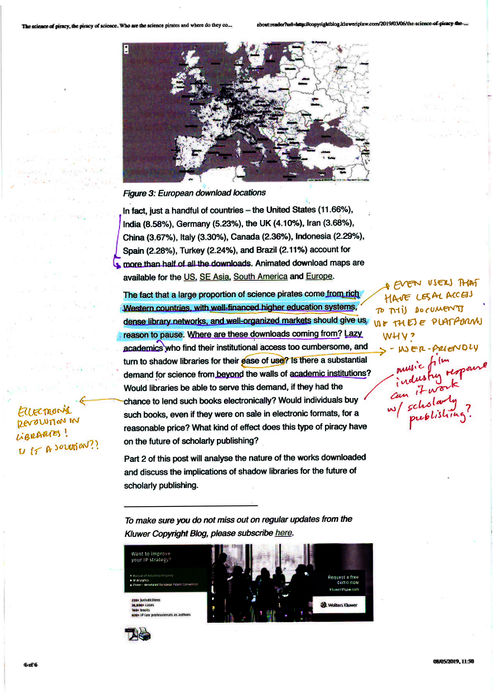User:Zpalomagar/RW&RM 3
MARGINAL CONVERSATIONS
General Intro
Rotterdam, 3 July 2019
Dear readers,
In the spring and summer of 2019 we developed The Library Is Open, a publication which focuses on the operations, actions, and roles of legal and extra-legal libraries. Central to this project is the community that forms around a collection of texts – the custodians of the collection and the readers.
The Library Is Open is the result of the third iteration of Interfacing the Law, an ongoing research project between XPUB and Constant (BE), which explores issues around extra-legal libraries, software and legal interfaces and intellectual property. Led by our guest editor Femke Snelting, we participated in many activities which were organised by invited guests:
With Bodó Balázs, an economist and researcher on shadow libraries, we analysed the gargantuan dataset of Library Genesis, to determine trends which indicate access to texts and the social, geo-political and economic aspects at play
.
With Anita Burato and Martino Morandi at the Rietveld Library in Amsterdam, we discovered the subjectivity of subjects and thorny issues of classification and representation
.
With other readers, we deepened our understandings of texts through collective annotations.
With artist and researcher Eva Weinmayr, who introduced us to The Piracy Project, we examined the possible motivations and differences between pirated books and their "source".
With open-source software such as Tesseract, pdftk, and LibreOffice (and many others) we explored the technical processes used during the creation of pirate libraries, and the hidden labour involved in this.
With fellow pirates, we considered the multiplicity of roles and activities involved in maintaining various libraries, such as Monoskop, Libgen, Aaaaaarg, Sci-Hub, Memory of the World, Project Gutenberg, +++.
With Dušan Barok, the administrator of Monoskop and an alumnus of the Piet Zwart Institute, we discovered how Monoskop was initiated and how it has changed over time.
The variety of our collective sessions, and the practical exercises we performed led us to organise an afternoon of three workshops that directly address the active role of piracy, rather than simply talking about it. Encouraging small, informal, collective actions, we wanted to challenge the ordinary, hierarchical presentation of research projects in the academic context, and individual notions of authorship.
When choosing a suitable venue for our event, we decided to ask Leeszaal (in Dutch "Reading Hall") to host our workshops. Situated in a busy, multicultural area of Rotterdam, Leeszaal exemplifies many values we sympathise with, particularly open access to knowledge, and a focus on the community that uses the space, not just for reading but for many other social purposes. These values we recognise (somewhat nostalgically) as reminiscent of public libraries of yesteryear. However, the landscape today is quite different, with huge online commercial repositories of texts (e.g. JSTOR), protected by paywalls which limit access to them, and in response the emergence of "shadow libraries".
In the following pages we invite you to wander through the dilemmas, outcomes and reflections that came out of our three different workshops, and interviews with people whose work is at the centre of the issues that each workshop uncovers.
Knowledge In Action explores the roles and activities within libraries, such as selection and inclusion of books. Interview with: Dubravka Sekulić & Leeszaal staff.
Blurry Boundaries reveals the hidden processes and labour between the publishing and distribution of physical and digital books. Interview with: Dušan Barok.
Marginal Conversations highlights the sociality of texts, and how they can become conversations through collective reading, annotation and performance. Interview with: Marcell Mars & Tomislav Medak.
Yours in piracy, XPUB
Marginal conversations Intro
Marginal Conversations is a workshop which explores collective reading, annotating and performing texts. We read, and write notes in the margins; usually in private, isolated from other readers. We come across texts with others' notes on them; the author unknown, their thoughts obscure. What happens when we share our notes, vocalise and perform them?
In this workshop, participants read, annotate and discuss the open letter "In Solidarity with Library Genesis and Sci-Hub", which asks for pirate library practices to come out from the shadows. This letter was selected for many reasons; it was an introduction for us to the thematic "Interfacing the Law", it's available in many languages, and presents an argument that generates interesting conversations. We compare annotations to detect common areas of interest and to also explore different methods, where readers can develop codes and techniques to extend the content of the source and express their personal understanding of it. The goal is not only to find areas of agreement, but also to discover tensions, disagreements etc. with the letter, which can also develop into fruitful conversations.
We leave traces of our reading, enriched by our doubts, sympathies, tensions and diverse understandings. We personalise the text, opening it up for collective conversations. Our voices occupy the space and leave traces on the text and in the library.
Workshop structure
Introduction
First of all, we have a quick round to introduce ourselves and share some thoughts around pirate/shadow libraries.
This workshop is divided in 3 parts:
Part 1: Reading && annotating
Part 2: Creating “heatmaps” && discussing through annotations
Part 3: Performative reading and recording
Why annotate together?
We see annotations as a way to express our understandings, questions, comments, disagreements, tensions and positions about what we read.
We aim to form collective understandings of this text and open up conversations about its theme; shadow libraries and piracy practices.
We explore ways in which texts can become conversations through collectively reading aloud and performing our annotations.
Part 1: Reading && annotating
— Organisation: Individual
— Materials: Annotation packs, containing: a) an A3 printout of the open letter “In Solidarity with Library Genesis and Sci-Hub” in English, b) an A3 sheet of carbon paper, c) an A3 sheet of tracing paper, and four-colour ballpoint pens
— Supplementary Materials: A4 printouts of the open letter “In Solidarity with Library Genesis and Sci-Hub”, in languages other than English (Bulgarian, Belarusian, Dutch, German, Spanish, French, Hindi, Hungarian, Italian, Mandarin, Portuguese, Romanian, Russian, Slovakian, Croatian, Ukranian)
Steps:
1. Provide the annotation packs.
2. If needed, provide the text in languages other than English to support our reading.
3. Each participant reads the text individually.
4. Each participant annotates the text on their annotation pack.
How can texts be extended?
The provided tools provide possibilities for participants to create diverse codes and levels of expression.
We don’t see this text as a sacred document. Our aim is to extend its content and enrich it with our collective questions, doubts, agreements, disagreements, points for conversations.
Part 2: Creating “heatmaps” && discussing through annotations
— Organisation: Groups of 2-3
— Materials: Same as Part 1
Steps:
1. Divide in groups of 2-3 people.
2. In our groups, compare our annotations and discuss the text. What was interesting? Did we make sense? Are there specific parts we want to discuss?
3. Create a “heatmap” of the text by placing tracing papers with annotations on top of each other, comparing which areas are annotated, how and why.
4. Each group selects parts of the text to read aloud and perform in Part 3.
What positions can be accomodated?
We collectively develop strategies to “amplify” specific parts of the text that we want to comment on, for diverse reasons, not only agreement.
We invite a plurality of positions and strategies; doubts, queries, tensions, suggestions, additions, experimentations, +++
Part 3: Performative reading && recording
— Organisations: All together
— Materials: Annotated “In Support of Library Genesis & Sci-Hub” letter, audio recording device, speakers
Steps:
1. Work with the paragraphs selected in the previous part.
2. Read aloud the text in turns (changing at every sentence).
3. Record!
4. Play the recordings from small speakers in the space of the library.
Why record our performed annotations?
We perform the text and our annotations in ways that show our positions and understandings. When we have an annotation, we do or say something (e.g. interrupt, raise our hands, make a noise, use an accent, use intonation to convey emotion etc).
The text becomes a “play”, a performance. We want to activate the text, by transforming it into a conversation through spoken annotation. The recording exists as a trace of our voices and bodies, with their expressive qualities, movements and sounds.
ANNOTATIONS
"What collection of materials would be best for you to annotate?"
For people in the future who have interest towards XPUB program. A collection of past readings are gathered on Git.
Because of the volume of the documents and time restraint, we develop mainly on annotation strategies, rather than aiming to annotate all the contents.
COLLECTIVE ANNOTATIONS
THE PIRATEBAY WORM
Abstract
The Pirate Bay is a digital and physical avant-garde media library in which you can find more than 6500 items including zines, books, CDs and DVDs. The users can access this library using two different paths. On the one hand the digital library is available online (http://thepiratebay.worm.org ) . Here you can find an extensive list of items that are available and you can obtain an identifier and description in order to facilitate the search process. Some of these items are directly available online so you can find a link to the content under the "relation" label (The Pirate Bay never offers you the files directly). On the other hand you can use the physical library placed in Worm-Rotterdam that you can visit in pre-defined time slots (Every Wednesday till Friday from 20.00-23.00 you can access ). The access to this library is free and it's promoted under the slogan "downloads are boring and passé" encouraging users to have a physical approach to the items that they are interested in.
This library is based on a "do it yourself" attitude. You can visit the physical storage and photocophy zines or books, digitise the VHS tapes or burn CDs or DVDs and everything for free. Worm Pirate Bay library is not just a place to copy paste it's also a space to enjoy. Promoted under the name: THE DISPLAY, this area allows you reading, watching, listening and sleeping inside this soft, pink womb. Pirate Bay library believes that "everything is for everyone", and "copyright is the biggest killer of creativity" so this library is publishing all this content defending that its latest goal is a global and common interest.
Questions
What is the motivation to make such a library? The idea of creating a community seems to be there ; to what degree is it built on an existing infrastructure.? They used to have a DVD library and a bookshop used to be there (so the conditions for a publically shared space were already established.. What are they trying to achieve by dividing the avilable time to visit it into time small time slots, does this create a space that while being more limited also enhances the community aspect of it? The physical space of worm is directly connected to the web library. It requires some effort to go there, some time too. Is that an important feature? Is fast access not a priority? By asking users of the library to pirate material on location, who bears the responsibility for breaking the law? Is this a phenomenon of the withdrawal of social welfare, allowing new agents to appear in place of what used to be the responsibility of the state? Is there a battlefield of whose responsibility is to provide a public library, and to offer knowledge? If you have to do a physical work to obtain your information ( photocophy, burn a cd) you are more careful and selective with the information that you are interested in. How do you know you are breaking the law? Are you conscious you are breaking the law? If I am not conscious when I am breaking the law. Am I doind that by accident? Does the action of copying raise my awareness that 'property is theft' (everything is for everyone)? To what degree is it a symbolic institution? Which are the regulations when you are copying something in a physical field? Is this physical and close relation safer when we talk about breaking the law terms? Is there any intention of curating material or is everything valid? They have tags There should be a connection between the people who run it and the content; requires effort from user and custodans.

